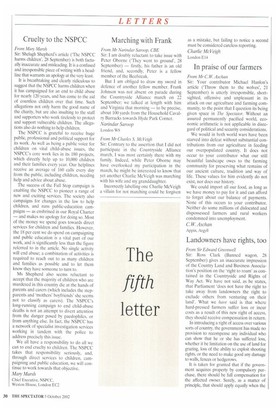Cruelty to the NSPCC
From Mary Marsh Sir: Shelagh Shepherd's article (`The NSPCC harms children'. 28 September) is both factually inaccurate and misleading. It is a confused and irresponsible piece of writing with a headline that warrants an apology at the very least.
It is breathtaking and clearly ridiculous to suggest that the NSPCC harms children when it has campaigned for an end to child abuse for nearly 120 years, and has come to the aid of countless children over that time. Such allegations not only harm the good name of the charity, but are also insulting to the staff and supporters who work tirelessly to protect and support vulnerable children. The allegations also do nothing to help children.
The NSPCC is grateful to receive huge public, professional and political support for its work. As well as being a public voice for children on vital child-abuse issues, the NSPCC's core work lies in its 180 projects, which directly help up to 10,000 children and their families every year. Our helplines receive an average of 160 calls every day from the public, including children, needing help and advice about abuse.
The success of the Full Stop campaign is enabling the NSPCC to pioneer a range of new and exciting services. The society also campaigns for changes in the law to help children, and runs public-education campaigns — as enshrined in our Royal Charter — and makes no apology for doing so. Most of the money we spend goes towards direct services for children and families. However, the 18 per cent we do spend on campaigning and public education is a vital part of our work, and is significantly less than the figure referred to in the article. No single activity will end abuse; a combination of activities is required to reach out to as many children and families as possible and to let them know they have someone to turn to.
Ms Shepherd also seems reluctant to accept that the majority of children who are murdered in this country die at the hands of parents and carers (which includes the stepparents and 'mothers' boyfriends' she seems not to classify as carers). The NSPCC's long-running campaign to end child-abuse deaths is not an attempt to divert attention from the danger posed by paedophiles, or from anything else. In fact, the NSPCC has a network of specialist investigation services working in tandem with the police to address precisely this issue.
We all have a responsibility to do all we can to end cruelty to children. The NSPCC takes that responsibility seriously, and, through direct services to children, campaigning and public education, we will continue to work towards that objective.
Mary Marsh
Chief Executive, NSPCC, Weston House, London EC2




































































 Previous page
Previous page